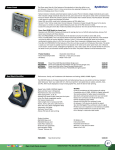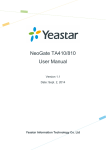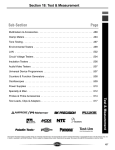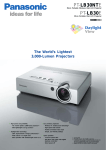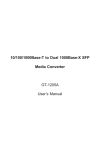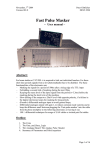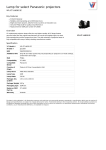Download Test-Um TG200 User's Manual
Transcript
TG200 Page 1 INSTRUCTIONS FOR USE To Check the Status of a Phone Circuit 1) Move slide switch on left side of Turbo Tone™ to the STATUS position. TG200 Part No. 2) Connect black lead to TIP and the red lead to RING or one lead to each wire of the pair if designation is unknown. Turbo Tone • If NRM lights up, it means the polarity is correct and the black lead is connected to TIP. ™ TONE GENERATOR • If the REV lights, then the leads are reversed. Operating Instructions • If the NRM or REV LED is bright, the line is not in use. • If the LED is dim, the circuit is in use. • If both NRM and REV are on or flashing, an AC voltage is present. FEATURES Application Hints: The TIP signal is nominally at ground potential. Attaching the black lead to a ground point and connecting the red lead to each wire of the pair can identify the RING line. When the red lead is connected to RING, the NRM LED will light. • Four tone amplitude levels— normal and half plus TURBO normal and half • Half amplitude is unbalanced for stronger signal on twisted pairs The status LEDs also indicate a ringing line by both NRM and REV LEDs flashing brightly. To verify a phone line, connect the Turbo Tone™ in STATUS mode to the line to be tested and call that line’s number from another line. The Turbo Tone™ status LEDs should indicate a ringing line. • Three distinctly different tones selected from front panel • Constant Amplitude Signal over life of battery for 100% signal strength all the time • Auto-off—tone turns off after 3 hours— no dead battery if left on • Tone may be added in any mode— allows phone sets without monitor feature to pick up tone • No power draw in continuity mode with leads open— no dead battery if left in continuity • RJ jack allows use of modular cable without adapters --1-- Note: The RJ jumper cable that has been provided with the Turbo Tone™ uses a unique colored modular connector that can be plugged into a RJ11 jack or a RJ45 jack without damaging either. Thereby allowing CAT 5 output points to be accessed without using an adapter. To Check Continuity of a Circuit Use only on non-energized circuits. Any energy present may damage the Turbo Tone™ or cause erroneous results. Turn off tone if necessary. Warning! 1) Move slide switch on left side of Turbo Tone™ to the CONT position. Do not attach to live AC circuits. This could cause an extreme shock hazard and damage the Turbo Tone™. Attachment to an unknown circuit should always be in STATUS mode. 2) Connect one lead of Turbo Tone™ to each end of the circuit to be tested. If the DC resistance of the path is approximately 11,000 ohms or less, the REV LED will light. --2-- --3-- TG200 Page 2 3) Move slide switch to TONE (OFF) when finished. The Turbo Tone™ draws no power when the leads are open, but the leads touching during storage in CONT could drain the battery. Note: The signal is strong enough with TURBO on to light both status LEDs. The NRM green LED will go out when continuity is found and the red LED will be brighter. To Supply Talk Battery Power 1) Move slide switch on left side of Turbo Tone™ to the CONT position. Be sure tone is off. 2) Connect Turbo Tone™ in series with a phone set at one end of a dead pair. To connect the Turbo Tone™ in series with a phone set, connect one lead from the Turbo Tone™ to one lead of the phone set and connect the two remaining free leads to the dead wire pair. 3) Connect a second phone set to the dead wire pair at the other end of the line. 4) Take both phone sets off hook and communications will be established. 5) Move slide switch to TONE (OFF) when finished. The Turbo Tone™ draws no power when the leads are open, but the leads touching during storage in CONT could drain the battery. To Send a Tone for Tracing 1) Move slide switch on left side of Turbo Tone™ to the TONE (OFF) position for normal operation, especially if toning powered phone lines. See Application Hints below for other configurations. 2) Connect leads across the line or attach one lead to ground and the other lead to one wire of a cable or pair to be traced. 3) Press the TONE button on the unit briefly to turn on the signal. If the desired signal level indicator (HI or LO) is not blinking, press the button briefly until the correct signal level is selected. The Turbo Tone™ rotates through a HI-LO-OFF sequence. --4-- 4) Select a different signal type if desired, as described in To Select or Verify Signal Type section. 5) To turn off the signal, press the TONE button briefly. If it has been more than 15 seconds since the last press, the Turbo Tone™ will go directly to OFF. If not, a second press may be necessary if the unit was set to HI. 6) Selecting the TURBO button will initiate the TURBO mode and the unit will begin to generate up to 700% more tone power output than when in regular HI and LO modes. The Turbo Tone™ LED and either the HI or LO LEDs blink in unison when TURBO mode is on. Application Hints: For long runs and when using the LO amplitude setting on to unbalance twisted pairs, turning on the TURBO mode increases the signal amplitude by over 500% . The TONE (OFF) mode minimizes the internal load on the tone generator and uses the minimum battery power. When tracing wires terminated to a terminal block such as a “66 block” or a patch panel, attaching both Turbo Tone™ leads to the cable or pair tends to contain the signal within the cable. The tracer must nearly touch the end of the cable to detect the signal, which is helpful when the wires are close together as when terminated. The LO amplitude setting may generate a stronger signal when connecting both leads of the Turbo Tone™ to a cable by reducing the field canceling effect of having a signal and its return close together, especially in twisted pair cable. A modular phone cable can be used to connect the Turbo Tone™ directly to a wall jack. To maximize radiated signal while tracing along a cable run, connect one lead of the Turbo Tone™ to the wire or cable and the other end to ground (such as the case of an electrical box, electrical conduit, metallic water pipe or ground rod). If no ground is available, do not connect the other lead to anything; let it dangle as near to the earth as possible. Connect the Turbo Tone™ to the ungrounded shield of a coax cable. The shield will do its job if connected to the center lead and block the tone. The LO amplitude setting is useful if there is too much bleeding of the signal or the tracer being used has fixed volume and is overloading. --5-- There are several useful techniques that take advantage of the ability to generate tone in any slide switch position. Both leads of the Turbo Tone™ must be connected to the pair in order for them to work. With tone on, the CONT mode can be used on a dead line to identify the line to a helper, or to verify having found both leads of a pair. Once the pair is presumed to be found, short out the pair and the REV LED should light on the Turbo Tone™, indicating the pair has been found. The CONT mode can also be used with tone to allow a phone set without a passive monitor function to hear the tone when the phone leads are attached across the pair the Turbo Tone™ is powering. To Select or Verify Signal Type The Turbo Tone™ has three distinctly different tone types available —one steady and two dual (or warble) tones. 1) Press and hold the TONE button until the four non-status LEDs turn on (lamp test), this indicates entry into the tone style selection function. 2) Continue holding the button down, one of the two LEDs will turn on steady or flash to indicate the currently selected type. The Single LED will turn on steady to indicate the single type is selected. The Dual LED will either flash for one of the dual tones or be on steady for the other. Releasing the button before two seconds have passed will leave the signal type unchanged. 3) To select another signal type, continue holding the button down until the desired type is displayed. The Turbo Tone™ will continue to cycle through the three types until the button is released or the unit times out and turns off (10 to 12 seconds). Hint: The currently selected tone type is generated at the RJ jack once the signal selection function is entered. Holding a tone tracer near the jack will allow the user to hear each tone type as it is selected. --6-- BATTERY REPLACEMENT Step #3 1) Remove screw on the rear of the Turbo Tone™ with a #1 Phillips screwdriver and remove battery door. 1) Insert two (2) #4-40-.250 screws (supplied) into drilled holes from inside of body. 2) Remove old battery and disconnect from battery leads. 3) Snap the battery leads onto a new battery (9V, alkaline). Place battery in case. 3) Place PCB board onto alignment posts (2) in bottom case. Direct battery terminal through bottom case, as shown. 2) Attach clip to body, as shown. 4) Close tester and replace screw. Do not over tighten. BELT CLIP INSTALLATION (Belt clip sold separately) Step #1 1) Remove two (2) #4-.750 body screws, as shown. 4) Place buttons (2) onto PCB board; make sure buttons are positioned flat on PCB board, with alignment posts inserted into corresponding holes in PCB board. Step #4 (Re-assembly) 2) Remove battery door and battery. 1) Insert cable into slot in bottom case (see detail A). 3) Lift off back cover and remove cable assem./strain relief from slot in back case. 2) Place slide switch cover in side slot (see detail B). 4) Separate back cover from rest of unit. 5) Place top case onto the assembly. Step #2 6) Hold complete assembled unit together firmly. Turn unit over. Insert body screw into top screw hole near RJ connector and tighten. 1) With back case removed from unit, locate two (2) counter sink marks on back side. 2) With .125 (1/8") dia. drill bit, drill holes into back case at both countersink marks. 7) Re-connect 9V battery and insert into battery compartment. 8) Place battery door into position. Insert second body screw into lower screw hole and tighten. 3) Clean any burrs and debris from inside of body. --7-- --8-- --9-- TG200 Page 4 ACCESSORY PARTS WARRANTY WARRANTY SERVICE All Lil’ Buttie™ series test set cords will work with the Turbo Tone™: Test-Um Inc. guarantees to the end-user purchaser that its products, and each of the parts thereof, will be free of all defects in material and/or workmanship. This warranty extends for a period of 12 months from the date of manufacture or proof-of-purchase. All units returned for warranty repair will be repaired or replaced free of charge, at the discretion of Test-Um Inc., and will be shipped freight prepaid. In the event that a sales receipt or other dated proof-of-purchase documentation is not available, a period of not more than 12 months from date of manufacture shall apply. LB10 Lil’ Buttie™ cable set with alligator clips (5.5 ft in length) LB20 Lil’ Buttie™ cable set with angled piercing clips (5.5 ft in length) LB30 Lil’ Buttie™ cable set with angled bed-of-nails clips (5.5 ft in length) LB75 Telco Clip (requires drilling two holes in case) SPECIFICATIONS Power Requirements one 9 volt alkaline battery Battery Life (Alkaline, 540 mA-hr) 120 hours typical Tone frequencies (±1%) Dual – 1165 and 874 Hz Single – 999 Hz The obligations of Test-Um Inc. under this warranty is limited to the repair or replacement (at our option) during the warranty period of any part that proves to be defective in material or workmanship under normal use, installation and service, provided the product is returned to Test-Um Inc. freight prepaid. Products returned to us must be accompanied by a copy of the purchase receipt. In the absence of such a receipt, the warranty period will cease 12 months from the date of manufacture. This warranty does not extend to products which have been subjected to neglect, accidental or improper use, or to units which have been altered, repaired, or inspected by other than Test-Um Inc. authorized personnel. In no event will Test-Um Inc. be liable for any incidental or consequential damages. Service Tone power Typical (into 600 ohms, new battery to 5.0V) LO = 1.7 dBm HI = 7.6 dBm TURBO LO = 10.8 dBm TURBO HI = 16.6 dBm Voltage protection Status: DC = 60 volts continuous, AC = 300V peak, 2 sec Continuity (into 600 ohms): DC = 52 volts Tone: 250 DC or peak AC volts Dimensions Width: 1.75 inches Length: 4.5 inches Depth: 1.3 inches Weight 5.0 oz. with battery Specifications subject to change --10-- The Turbo Tone™ is designed and manufactured to provide trouble-free service. However, if for some reason your tester should require repair, please follow these instructions. Shipping 1. Before returning any product to Test-Um Inc., you must first request a Return Goods Authorization Number by contacting our Customer Services Dept. at 805-383-1500. No shipments will be accepted without this number, which must be clearly marked on the shipping label. 2. Ship the tester with a copy of the sales receipt, if available. 3. Attach a description of the operational problem. 4. Include a contact name, phone number and e-mail address (if possible). 5. Pack securely to prevent damage during shipping. 6. Ship prepaid to: Test-Um Inc. 808 Calle Plano, Camarillo, CA 93012 --11-- Test-Um Inc. 808 Calle Plano Camarillo, CA 93012 www.test-um.com PHONE (805) 383-1500 FAX (805) 383-1595 --12--





